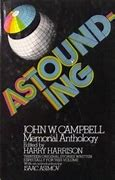"...this ending of a saga on which so long we worked together."
-Poul Anderson, David Falkayn: Star Trader (Riverdale, NY, March 010), p. 682.
Campbell edited:
Robert Heinlein's Future History;
Isaac Asimov's Robot stories and Foundation series;
James Blish's Okie series;
Poul Anderson's Nicholas van Rijn series.
He advised:
Asimov to see what would happen if Seldon's predictions failed;
Blish that the Okies should be a series, not a one-off story, and also that the germanium basis of the Oc dollar should fail.
He gave Anderson the ideas that became to Ythrians' biological supercharger and the supermetals planet, Mirkheim.
Five series and five influences. There were more influences. These are just the ones that I know about.

6 comments:
Campbell could be very original. Or, at times, extremely weird...
I thought that his advice to Asimov -- see what happened when Seldon's predictions failed due to the Mule -- was excellent.
Of course, it's my belief that prediction of the sort that 'Seldon' postulated is inherently impossible; history is simply too contingent.
At other times, like when he got into psionics... oi, vey.
Kaor, Mr. Stirling!
I agree, Campbell's advice to Asimov about the Mule made those parts of the FOUNDATION stories featuring him more interesting than the others.
I agree, Seldon style predictions about the future are impossible, history is too chaotic and contingent for that. Which is why Anderson eventually moved away from things like "psychotechnics."
I think Campbell also took an interest in absurdities like perpetual motion machines.
Ad astra! Sean
Sean: yup, I remember the perpetual motion machine.
The problem with Campbell was that he rejected conventional wisdom.
Sometimes that's brilliant. Other times...
"Seldon's predictions failed"
A related point is that Donald Kingsbury wrote "Psychohistorical Crisis" set in Asimov's 2nd Galactic Empire with the serial numbers filed off. For a bit of a spoiler, it is what happens when other factions than the original psychohistorians figure out enough of the methods of psychohistory to start pushing things in the directions they want rather what the 1st psychohistorians want.
One nice feature of the book is that the variety of a galactic scale empire is fleshed out more than Asimov did.
Kaor, Mr. Stirling and Jim!
Mr. Stirling: IOW, Campbell was a bit like Tesla, often brilliant and just plain wrong at other times.
Jim: You make Kingsbury's story look interesting, something to look up.
I agree, the background for Asimov's FOUNDATION stories was mostly flat and colorless. Aside from too rare exceptions like "Blind Alley," set in the early Galactic Empire, we don't see all that much about the Empire.
Ad astra! Sean
Kaor, Jim!
I also like the beginning paragraphs of Chapter 22 of FOUNDATION AND EMPIRE, "Death on Neotrantor," one of the few times Asimov rose to lyrical prose.
Ad astra! Sean
Post a Comment